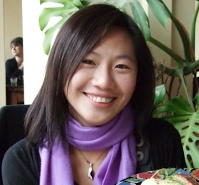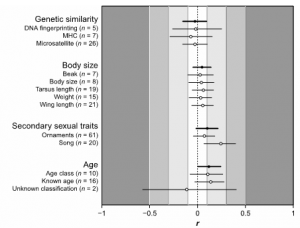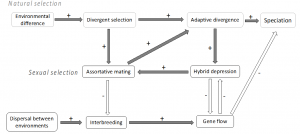|
Assistant Professor Prof. Hsu, Yu Hsun |
||||||||||||||||||||||||||||||||||
 |
||||||||||||||||||||||||||||||||||
|
中文 Personal Website: https://sites.google.com/site/yuhsunhsu/ Research interests and research aims Our research interests lay on the formation of variations within and between species. To investigate the causes and consequences of these variations, we broadly apply methods in behavioral ecology, along with population genomics, to study these evolutionary questions. Currently we are working on two topics: (1) speciation, and (2) mating systems and mating strategy.
Speciation Speciation is often a long and windy road in which populations of the same ancestral species diverged into two separated species. In most cases, natural selection caused by environmental factors altered divergent selection and resulted in adaptive divergence between taxa (i.e. ecological speciation). In this process, sexual selection sometimes reinforces such divergent selection through assortative mating or female preference on species-specific traits to speed up the speciation process. However, when gene flow occurred during speciation, the divergent selection could be weakened by genetic admixture caused by interbreeding (Figure).
Mating systems and mating strategy Animal mating systems can roughly be categorized into four types: monogamy, polygyny, polyandry and promiscuity. Interestingly, In some species, multiple mating systems can co-occur in the same population. We therefore are interested in how different mating systems evolved and being maintained. Our current research interest focuses on extra-pair mating in socially monogamous birds. Extra-pair mating is commonly occurred in most socially monogamous passerines. On the one hand, extra-pair mating is beneficial to the males – this mating strategy increases male fitness by increasing the number of their offspring, without much costs because they usually provide zero paternal care to extra-pair offspring. However, when females engage in extra-pair mating, they are under the costs of reduced offspring fitness due to reduced paternal care from their cuckolded partners. Therefore, most hypotheses posit that females should be able to obtain benefits from extra-pair mating, such as producing extra-pair offspring with higher fitness by mating with larger, stronger, sexier extra-pair males or males with compatible genes with themselves. However, recent meta-analysis did not support these adaptive explanations (Figure). Our research is therefore aiming at investigating other potential explanations of female extra-pair mating. 
|
||||||||||||||||||||||||||||||||||
|
||||||||||||||||||||||||||||||||||
跳至主要內容
國立成功大學-生命科學系










